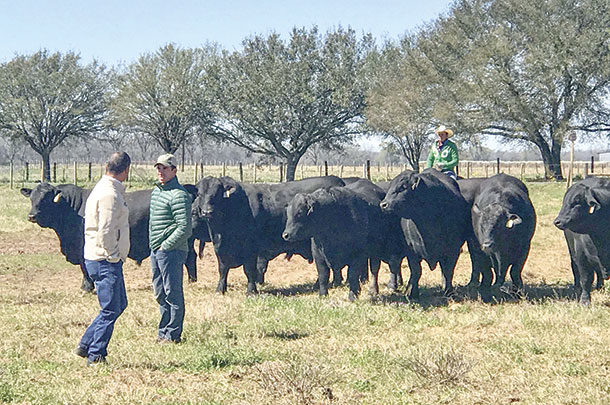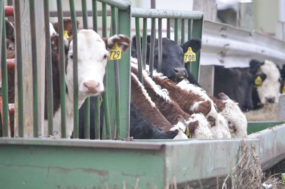Though advances in embryo transplant have pushed most seedstock operations into a new realm of livestock science and genetics, simple things like the internet and transportation have had just as much impact on this area of production.
With marketing and genetic advancement seemingly blown wide open, I sat down with three prominent seedstock producers to find out what makes their operation successful each year.
P.W. Gillibrand Cattle Company
Located in the rolling hills and oak trees of Simi Valley, California, P.W. Gillibrand Cattle Company (PWG) is a fairly new face in the purebred seedstock world. With their bull business beginning in 2015, ranch manager Dwight Joos and the Gillibrand team have learned quickly what makes or breaks a seedstock producer.
Consigning their purebred Hereford bulls at multiple sales across California, P.W. Gillibrand Cattle Company works to provide a vast array of genetics that will be successful for any cow-calf producer. “No two customers want the same thing,” says Joos. “You’ve got to be able to fill the range.”
With California, Oregon and Nevada making up much of the market for this company’s polled and horned Herefords, bulls could go to areas with moderate climate and landscape or somewhere with freezing temperatures and steep mountain terrain. Regardless of where they’re going, PWG has worked hard through their embryo transplant program and base herd to produce herd sires and semen that will get a cow-calf producer what they really need: growth.
“Growth is what our customer gets paid on,” says Joos, noting that carcass merit, weaning weight and yearling weight are top priorities for their operation when it comes to putting high-quality sires into the market.
While many of the bulls are sold at bull sales throughout California, PWG offers free transportation for their in-state buyers. “There is no such thing as too far for a buyer,” Joos says.
In just five years, PWG herd sires have become well-known across the northern states. Joos notes that while their herd sires have to be able to hold up in very diverse settings, their company has to be willing to go the extra mile for buyers.
DeBruycker Charolais
An old timer in the bull sale arena, DeBruyker Charolais of Dutton, Montana, is a prime example for seedstock success across multiple generations. Started in 1963 with just 12 heifers and a purebred bull by Lloyd DeBruycker, this operation has grown to become the largest registered Charolais herd in the world and a premier source for purebred herd sires.
Kesler Martin, DeBruycker’s grandson, is now a partner in the brand and one of five family operators providing breeding stock for their program. Family aside, it’s all business with this seedstock operation. “We have to have good enough cattle to stay in the brand,” says Martin.
Watching the sale at DeBruycker the first Saturday in April makes it pretty obvious why they are top dog in the purebred Charolais world. Over 600 bulls are sold in one day, and the majority is sold through Superior Livestock with online bidding and open phone lines. “Nevada and Arizona have been really good to us,” says Martin, “but we’ve sold in most states and some international.”
Taking advantage of the ease and cost-effectiveness of live sales online has helped them maintain a national reputation and provide commercial producers with quality herd sires.
Focusing on good genetics has also put DeBruycker at the top of many commercial buyers’ lists. Breeding and embryo transplant have helped these cattle become top performers in areas like heat tolerance, withstanding colder temperatures and solid bone structure for traveling. “Charolais cattle seem to handle adversity well,” Martin says.
However, all the test results in the world can’t quite compare to the power of a producer who stands by their cattle. The operators behind the DeBruycker brand take their business full circle and often purchase Charolais cross feeder calves sired by their genetics for their own backgrounding operation. “We believe in our bulls,” Martin says.
Santa Rosa Ranch
With a constant evolution happening in the seedstock world, producers like Santa Rosa Ranch in Texas have found ways to develop their business to fit their customers’ needs. As the largest registered breeder of Brangus and Ultrablack cattle in the U.S., the decision to sell through private treaty only means “Every day is sale day at Santa Rosa Ranch.”
“We service bull buyers from all over the U.S.,” says Kelley Sullivan, co-owner of Santa Rosa Ranch, “and we ship live animals, embryos and semen internationally.” Despite having sold bulls at consignment sales in the past, Sullivan says only selling by private treaty has helped Santa Rosa Ranch truly know their customer base. “As marketing evolves, we have to adjust our program,” Sullivan says.
Being able to focus on individual customers and their particular programs allows Santa Rosa Ranch to maintain quality control for their buyers year after year. With everything from breeding, testing and development done “in house” at the ranch, the Sullivans and their general manager, Kent Smith, are dedicated to providing customers with “efficient, functional and high-performing genetics.”
Selling anywhere between 250 to 400 bulls annually, customers who choose to buy from Santa Rosa Ranch have plenty of options year-round. Sullivan says with their wide demographic of buyers, their bulls need to be ready for whatever lies ahead and because of that, the ranch focuses on developing bulls in large pastures with a heavily forage-based diet. “We don’t know where they are going to end up,” she says, “so we develop the bulls and set them up for success so they don’t get turned out and fall apart.”
Though the Santa Rosa Ranch has taken a different route than many seedstock operations across the country, Sullivan believes their program provides buyers with a customized experience when it comes to finding the right match for their own herd. “Our gate is always open,” says Sullivan. ![]()
PHOTO: Buyers from Argentina select bulls from Santa Rosa Ranch in Texas. Courtesy of Santa Rosa Ranch.
Lydia Kyle is a freelance writer based in California.








